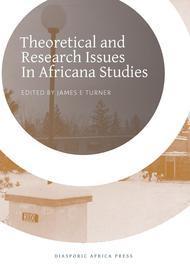
BOOK STORE
Theoretical And Research Issues In Africana Studies
The year of 1980 marked a pivotal turning point in the American political landscape. David Harvey writes, “Future historians may well look upon the years 1978-1980 as a revolutionary turning-point in the world’s social and economic history… revolutionary impulses seemingly spread and reverberated to remake the world around us in a totally different image.” Black activists and intellectuals also felt the ground moving beneath their feet, as many gradually shifted from an all out advance towards liberation to a posture concerned with what James Turner described as “the preservation of the modest gains made by African Americans over the last decade.” The previous decade witnessed an obvious waning in the Black liberation movement, a slew of high-profile manhunts, arrests, court cases and outright criminalizing of radical activists, the unearthing of Cointelpro, the blooming of the liberation movement in Southern Africa, a taxing debate around various articulations of Marxism and Black nationalism, the full swing of feminism, and a full decade of Africana Studies, which also meant institutionalized space to foster such discussions. It was these changing times that provided the context for the important gathering of Black activists and intellectuals in Ithaca, New York, during September 1980 at the Africana Studies and Research Center at Cornell, and the content for this book. Bound together by the dual purposes of both assessing the road traveled and preparing for the journey ahead, the ensemble in attendance gathered to ponder, “the Next Decade”—as the conference theme spelled out plainly.
A quick glance at the conference’s list of attendees demonstrates the extraordinary sphere of activity that was the Africana Studies and Research Center at Cornell. Participants and attendees at this historic meeting included Toni Cade Bambara, Lerone Bennett, Johnella Butler, John Henrik Clarke, Gayla Cook, Louis Farrakhan, Hoyt Fuller, Ewart Guinier, Vincent Harding, Robert Harris, Stephen Henderson, Robert Johnson, George Kent, George Lamming, Tilden Lemelle, Bernard Magubane, Manning Marable, William Nelson, William Sales, Michael Thelwell, Bettye Collier-Thomas, Eleanor Traylor, Ivan Van Sertima, Ronald Walters, Shirley Weber, Sylvia Wynter, Howard Dodson, William Strickland, and two of the visual artists featured in this book, David Bradford and Bertrand Phillips. This book is both a contribution to the historiography of the Black/African Studies movement and an intellectual treasure, representing the ideas and visions of many of the best minds at a crucial juncture in the African world.

